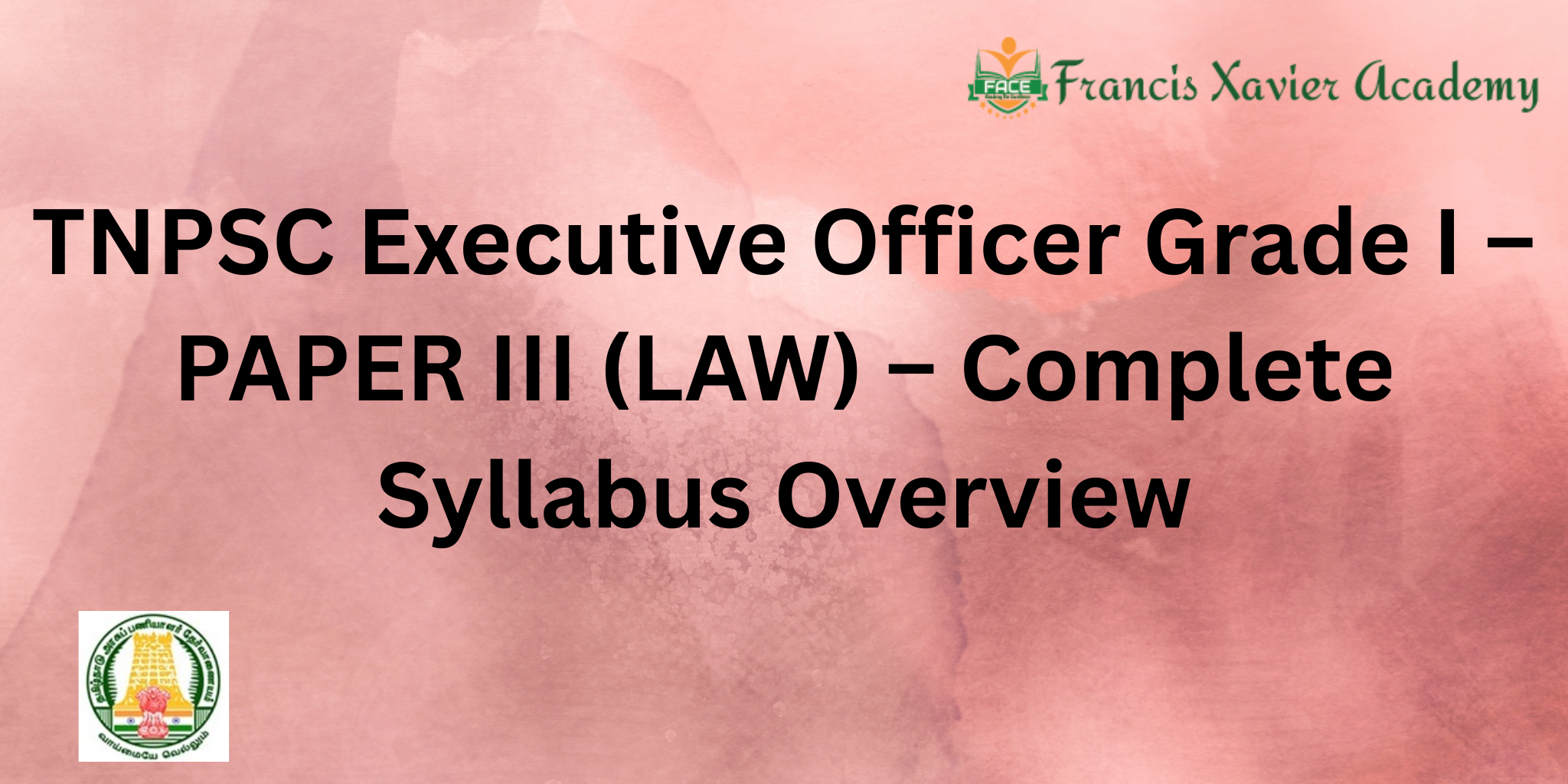
Are you preparing for TNPSC Executive Officer Grade I – PAPER III Syllabus? This objective-type paper covers a wide range of legal subjects, essential for aspirants aiming to clear the Executive Officer Grade I exam. From foundational legal concepts to personal laws and environmental legislation, the syllabus is designed to test both your theoretical understanding and practical application of law. In this blog, we provide a unit-wise breakdown to help you navigate and master the key topics with confidence.
Let’s dive into each unit in detail:
UNIT I: Jurisprudence
This unit lays the philosophical groundwork of law. You’ll study:
- Sources of Law: Legislation, precedent, and custom.
- Schools of Jurisprudence: Analytical, Historical, Philosophical, and Sociological schools.
- Core Legal Concepts: Rights and duties, legal personality, possession, and ownership.
UNIT II: Constitutional Law
Understanding the Constitution of India is essential. This unit covers:
- Fundamental Rights and Duties
- Directive Principles of State Policy
- Doctrine of Separation of Powers
- Checks and Balances
- Judicial Review
- Federalism
- Emergency Provisions
UNIT III: Contracts
A cornerstone of civil law, this unit covers:
- Essentials of a valid contract
- Void and voidable agreements
- Performance and discharge
- Quasi-contracts
- Contracts of Indemnity and Guarantee
- Bailment and Pledge
- Sale of Goods
- Partnership Law
UNIT IV: Law of Torts
Explore the civil wrongs that constitute torts:
- Definition and nature of tortious liability
- General Defenses
- Vicarious Liability
- Specific Torts: Nuisance, Negligence, Assault, Battery, Defamation
UNIT V: Law of Crimes
This unit deals with criminal law fundamentals:
- Definition and elements of crime
- General defenses
- Major Offences: Against the State, human body, and property
UNIT VI: Human Rights Law
Learn how India aligns with global human rights standards:
- UN Human Rights Institutions
- Indian Judiciary’s role in human rights development
- Key Legislations:
- National Commission for Minorities Act, 1992
- Protection of Human Rights Act, 1993
- Persons with Disabilities Act, 1995 & Rules, 1996
UNIT VII: Administrative Law
Explore governance and administrative mechanisms:
- Evolution of Administrative Law
- Delegated Legislation
- Judicial Review and Procedural Fairness
- Control of Administrative Discretion
- Role of Ombudsman, Lokpal, Lokayukta, and Central Vigilance Commission
UNIT VIII: Environmental Law
This unit highlights India’s commitment to sustainable development:
- Environmental Pollution and Key Legislations:
- Water Act (1974)
- Air Act (1981)
- Environment Protection Act (1986)
- Wildlife Protection Act (1972)
- Forest Conservation Act (1980)
- Biodiversity Act (2002)
- Ground Water Authority Act (1987)
UNIT IX: Transfer of Property Act
Focuses on various modes of property transfer:
- Lease, Tenancy, Mortgage, Sale, Gift
- Important State Legislations:
- Tamil Nadu Revenue Recovery Act, 1864
- Tamil Nadu Buildings (Lease and Rent Control) Act, 1960
- Tamil Nadu Court of Wards Act, 1902
UNIT X: Personal Law & Heritage and Archaeology
Covers personal laws across major religions and heritage protection:
- Hindu, Muslim, and Christian Personal Laws
- Key Areas: Succession, Adoption, Guardianship, Endowments
- Important Acts:
- Tamil Nadu Temple Entry Authorization Act, 1947
- Ancient Monuments and Archaeological Sites and Remains Acts (1958, 2010)
- Tamil Nadu Heritage Commission Act, 2012
- Antiquities and Art Treasures Act, 1972
Conclusion
The TNPSC Executive Officer Grade I – PAPER III Syllabus offers a well-rounded blend of jurisprudence, constitutional law, civil and criminal laws, human rights, environmental regulations, and personal law. Covering ten comprehensive units, it is designed to assess a candidate’s depth of legal knowledge and understanding of various statutory frameworks. With focused preparation and a clear understanding of each unit, you’ll be well-equipped to succeed in this highly competitive examination. Stay connected for more study resources, MCQs, and strategy tips tailored to this paper.
 Now
Now